How to Get Wrinkles Out of Curtains: 3 Simple Hacks That Work Every Time
TLDR;
To get wrinkles out of curtains fast, try one of these three proven methods: steaming them while they hang, using shower steam in a closed bathroom, or applying a wrinkle-release spray. These hacks work on cotton, polyester, blackout, silk, and delicate fabrics—without needing to take the curtains down.
Why Do Curtains Wrinkle? Common Causes & Fabric Differences
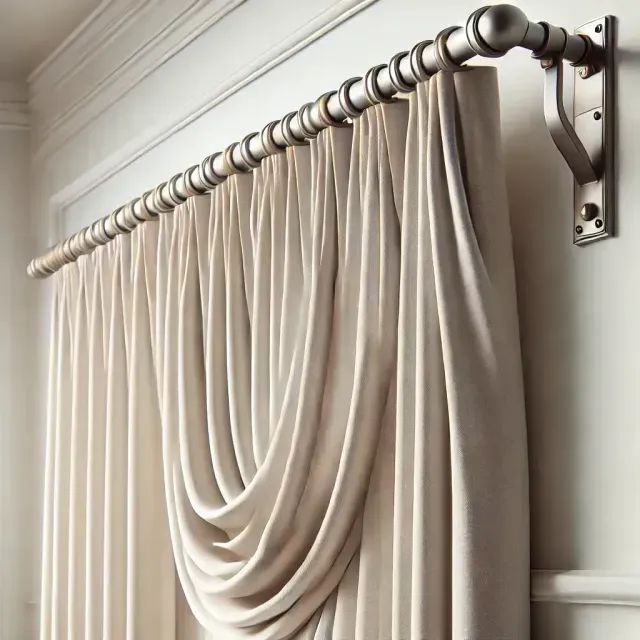
Curtains wrinkle for a variety of reasons, including how they’re packaged, stored, and hung. Some fabrics naturally resist wrinkles, while others crease easily due to their texture and thickness.
Key reasons curtains wrinkle:
- Fold lines from factory packaging or storage
- Thin or delicate fabrics like linen and silk crease faster
- Hanging curtains without ironing or steaming first
- Improperly sized curtain rods causing bunching
Let’s dig into how fabric types and handling methods affect wrinkle formation.
Understanding Different Curtain Fabrics
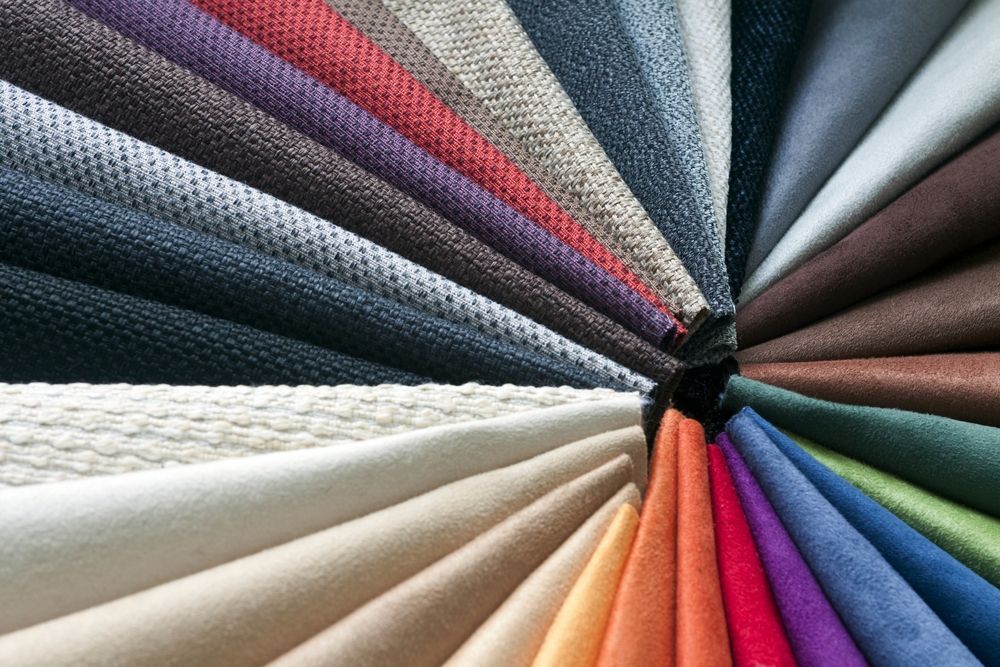
Each fabric behaves differently under stress and heat. If you’re wondering how these compare across different window treatments, check out our quick guide on Curtains vs Drapes. Here’s what you need to know:
- Cotton – Breathable and durable, but wrinkles easily.
- Polyester – Wrinkle-resistant, but creases can be stubborn once formed.
- Linen – Prone to deep wrinkles but looks great slightly rumpled.
- Silk – Extremely delicate. Needs careful steaming or professional help.
- Velvet – Heavy and rarely wrinkles, but when it does, it’s hard to fix.
- Blackout/thermal – Thick backing may wrinkle with folding, steam-friendly with caution.
How Storage & Hanging Methods Cause Wrinkles
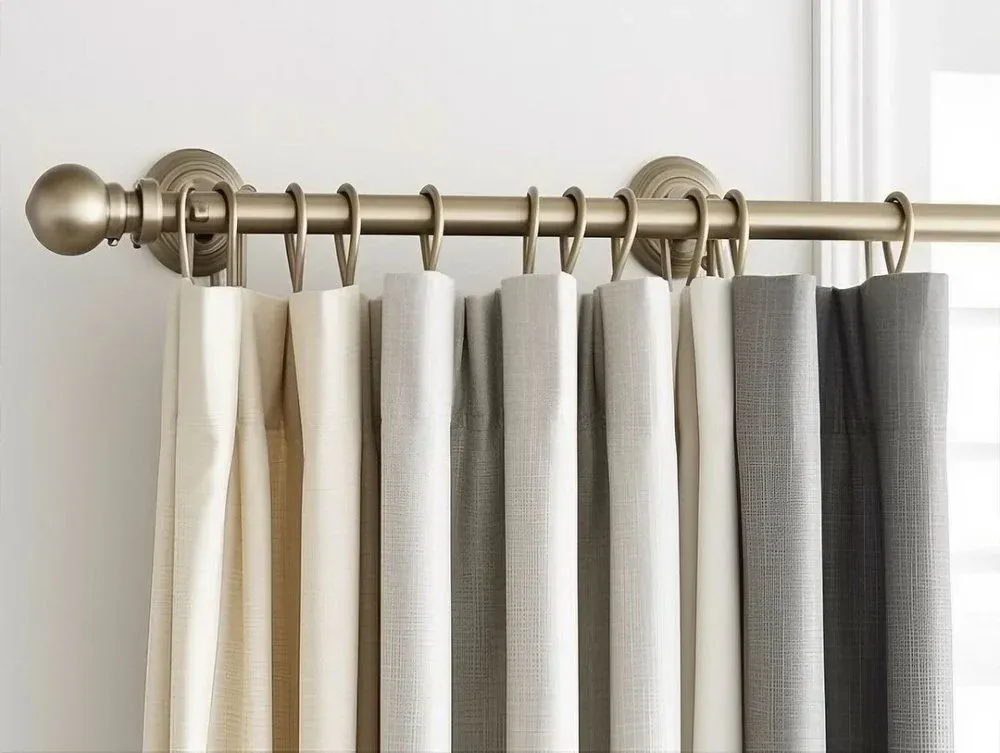
The way you store and hang your curtains has a big impact.
- Folding curtains tightly creates deep creases
- Storing in plastic can trap moisture and leave marks
- Hanging without smoothing out folds will keep wrinkles visible
- Using thin or too-short rods creates fabric bunching
Do Wrinkles Damage Curtain Fabric?
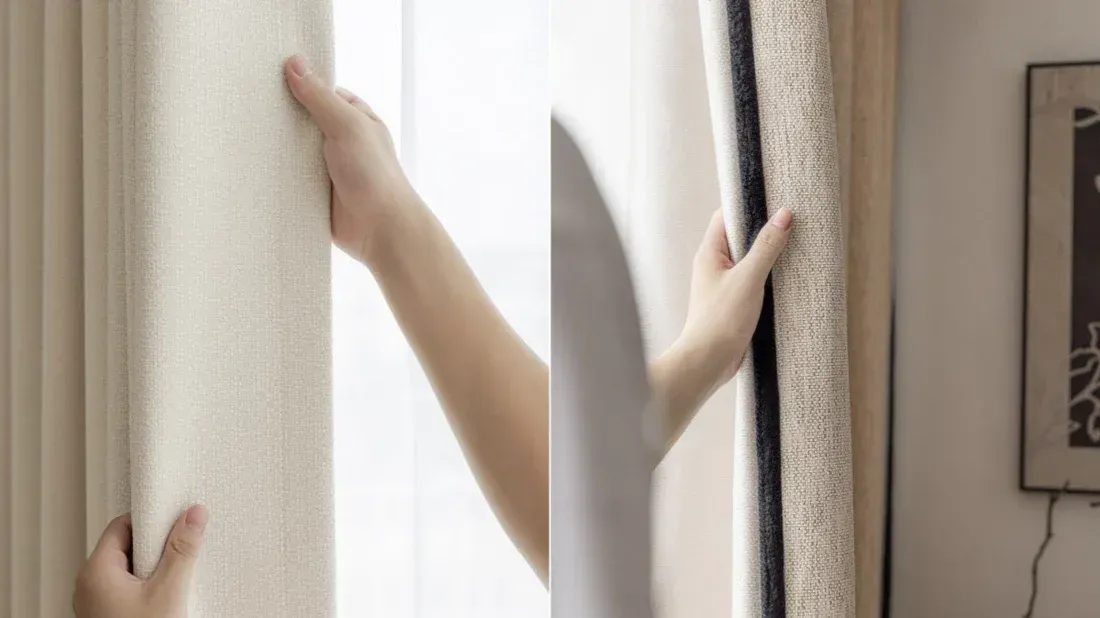
In general, no—wrinkles alone don’t damage fabric. However:
- Repeated creasing in the same spot can weaken fibers
- Overheating with an iron can scorch or shrink fabric
- Long-term wrinkling, especially in damp areas, may lead to mildew
Hack #1 – How to Steam Curtains (Without Taking Them Down)
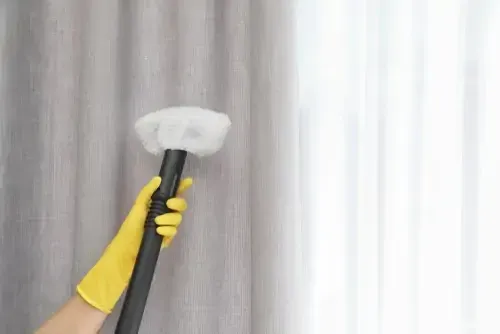
This is by far the fastest and safest way to remove wrinkles from curtains—especially without removing them from the rod.
Tools You’ll Need
- A
handheld garment steamer or
standing steamer
- A
step stool if needed
- Clean
distilled water (to prevent mineral spots)
- Optional: A
pressing cloth for delicate fabrics
Step-by-Step: Steaming Curtains While Hanging
- Fill the steamer with distilled water.
- Plug it in and wait for it to heat.
- Stand 6–12 inches away and slowly steam from top to bottom.
- Let the curtain air-dry in place.
- Repeat for heavily wrinkled sections.
Safety Tips for Delicate Fabrics
- Always test a small hidden area first.
- For silk or velvet, don’t press the steamer directly against the fabric.
- Use quick, gentle strokes.
- Open windows to help moisture dissipate.
Best Steamers for Home Use
Whether you’re a homeowner or a window treatment expert like Simply Window, these models are reliable:
- Jiffy Esteam Handheld Steamer – Great for everyday use.
- Rowenta X-Cel Steamer – Strong steam output and fast heat-up.
- PurSteam Elite Steamer – Affordable and lightweight.
Hack #2 – Use the Shower Steam Method (Perfect for Small Spaces)
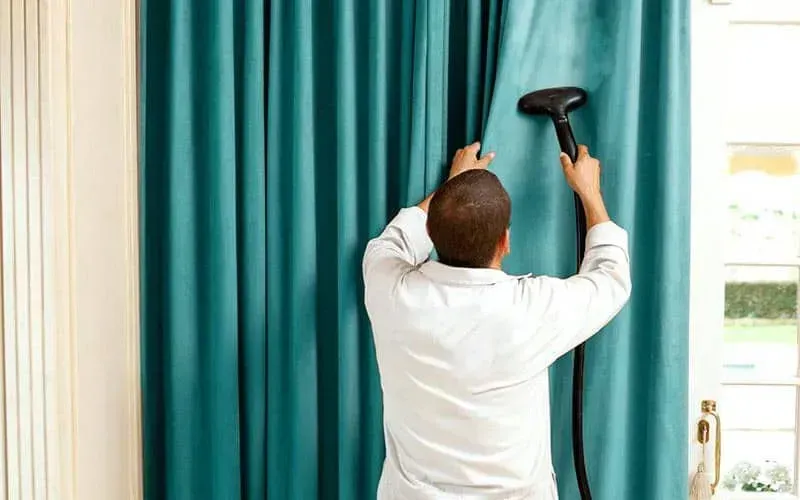
No steamer? No problem. This is an effective low-tech method.
How It Works
- Hang the wrinkled curtain in the bathroom
- Run a hot shower for 10–15 minutes (door closed)
- Let the curtain absorb steam and hang freely to dry
When to Use This Method
- You don’t own a steamer or iron
- You're working with lighter wrinkles or thin fabrics
- You live in an apartment with limited tools
Pros & Cons Compared to Steaming
Pros:
- No tools needed
- Safe for all fabrics
- Quick and hands-off
Cons:
- May not remove deep wrinkles
- Not ideal for blackout curtains
- Requires humidity control afterward
Hack #3 – Wrinkle-Release Spray (DIY & Store-Bought Options)
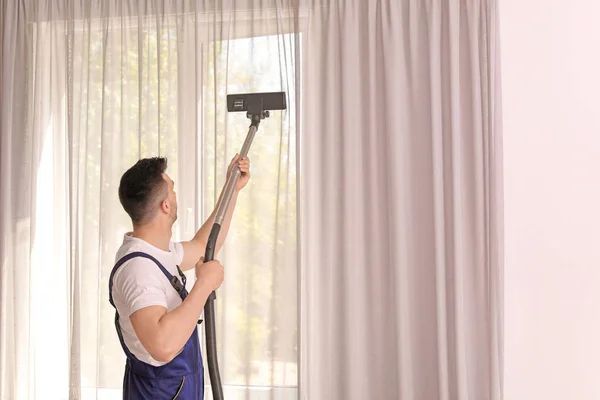
Sprays can be an easy fix when you’re in a pinch—just spray and smooth.
DIY Spray Recipe for Curtains
Mix the following in a spray bottle:
- 1 cup
distilled water
- 1 tablespoon
white vinegar
- A few drops of
fabric softener (optional for scent)
Shake well before use.
Best Commercial Wrinkle Sprays
- Downy Wrinkle Releaser – Most popular and effective
- Bounce Rapid Touch-Up – Fast-drying, fresh scent
- The Laundress Crease Release – Eco-friendly for delicate fabrics
How to Apply for Even Results
- Shake the bottle.
- Lightly mist the curtain—not soak.
- Use your hands to smooth wrinkles downward.
- Let it air-dry completely.
Caution: When NOT to Use This Method
- Avoid on
silk,
velvet, or
blackout curtains unless labeled safe.
- Don’t oversaturate—excess liquid can leave water spots.
Extra Curtain De-Wrinkling Methods That Also Work
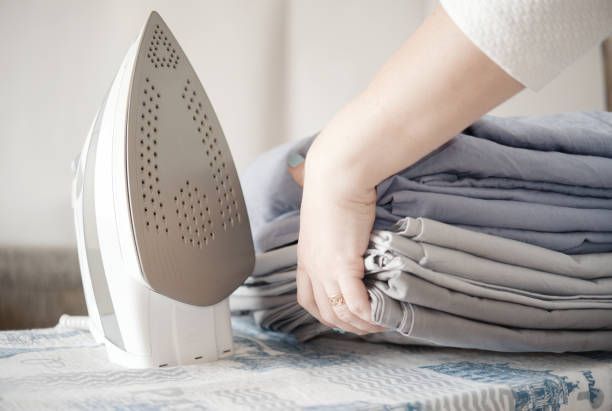
Sometimes, you’ll need a little extra firepower. These bonus methods help in stubborn situations.
Ironing Curtains (When It’s Safe & Effective)
- Use a
low-heat setting
- Iron on the
reverse side or use a
pressing cloth
- Ideal for cotton or linen curtains
- Avoid ironing blackout liners or synthetic blends directly
Dryer + Damp Towel Method
- Toss curtain and a damp (not wet) towel in dryer
- Run on
low heat for 10–15 minutes
- Remove immediately and hang to avoid new wrinkles
Use a Handheld Steamer with a Curtain Rod Hack
- Pin curtain gently with clothespins to keep taut
- Steam in sections, using gravity to pull fabric straight
- Works well for thick blackout or layered curtains
How to Prevent Wrinkles in Curtains After Hanging
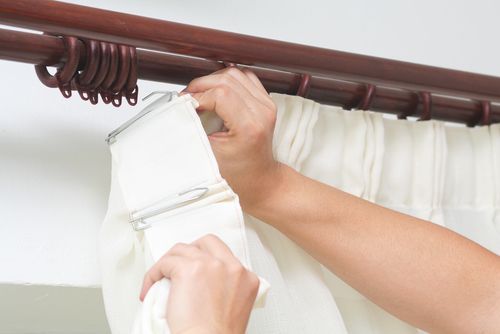
Prevention saves time and keeps your home looking polished.
Proper Hanging Techniques
- Use a
curtain rod that fully supports the weight
- Choose
clip rings or
grommets for even spacing
- Adjust pleats by hand once hung
How to Store Curtains to Avoid Wrinkles
- Roll instead of folding
- Store in
breathable fabric bags, not plastic
- Avoid placing heavy items on top
Should You Use Curtain Weights?
- Yes—for lightweight or sheer fabrics
- Keeps curtains straight and resistant to shifting
- Attach discreetly to bottom hem
What to Avoid: Mistakes That Can Damage Your Curtains
- Don’t iron
blackout curtains directly—risk of melting
- Don’t steam too close to
silk or velvet
- Avoid using
dryer sheets—they can stain
- Never fold damp curtains for storage
When to Call a Professional Curtain Cleaner
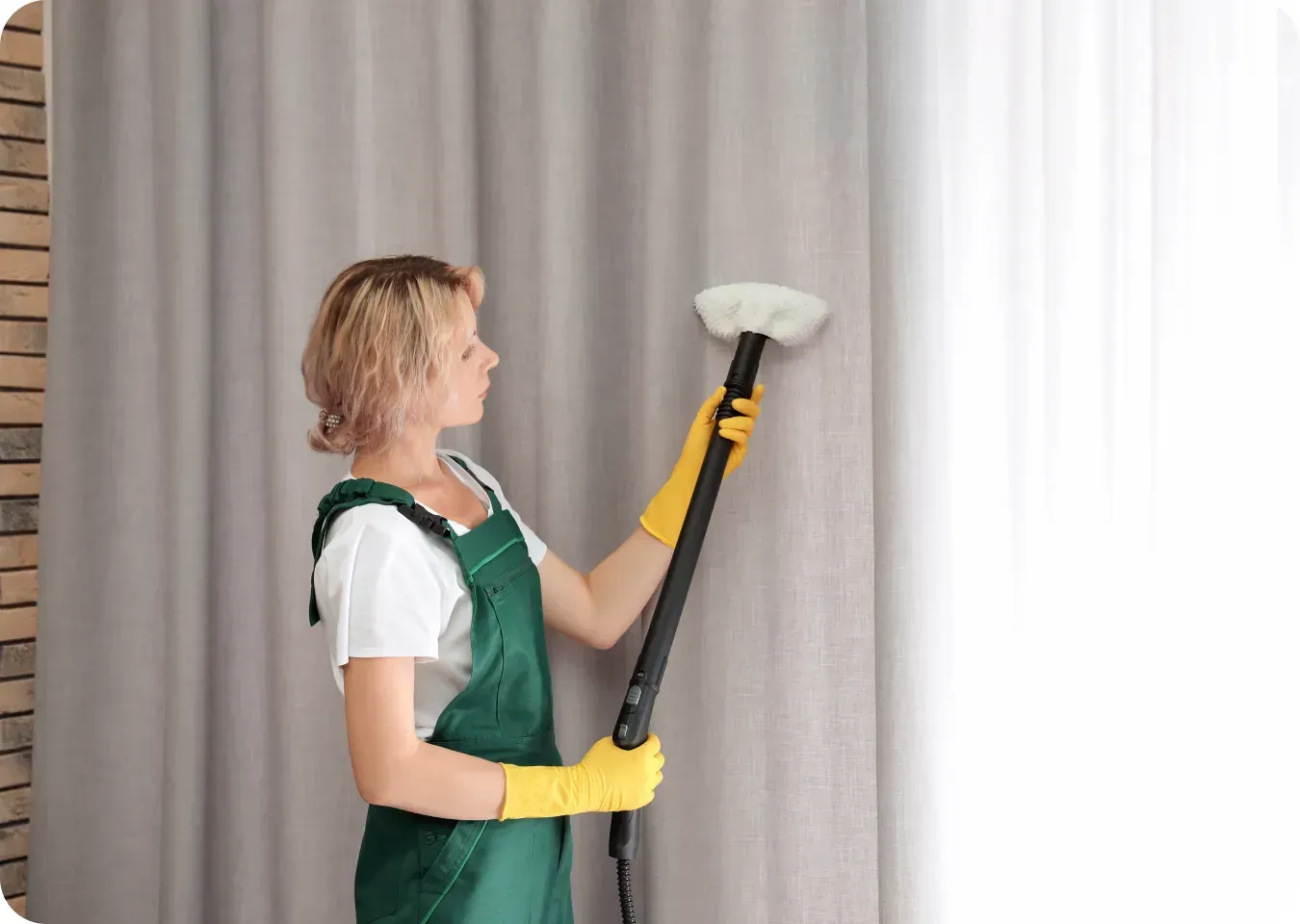
Sometimes, it’s better to leave it to the pros.
Fabrics That Shouldn’t Be DIY Steamed
- Silk,
velvet,
embroidered, and
hand-sewn fabrics
- Vintage or heirloom
drapery
- Curtains with detailed lining or trim
How Much Professional Curtain Cleaning Costs
- Starts at
$1–$6 per square foot
- Specialty fabrics can be higher
- Includes pickup and re-hanging in many cases
Pros and Cons of Hiring Help
Pros:
- Safe for delicate fabrics
- Deep cleaning and de-wrinkling combo
- No hassle or damage risk
Cons:
- Cost
- May require wait time for pickup/return
FAQ – Quick Answers to Common Curtain Wrinkle Questions
Can I iron blackout curtains?
Only on the fabric side with a low heat setting and pressing cloth—never directly on the liner.
How do you get wrinkles out of curtains without an iron?
Try steaming, shower steam, or a wrinkle-release spray for effective no-iron methods.
What’s the best way to get wrinkles out of new curtains?
Steam them while hanging right after unboxing. Don’t wait until they set in.
Is it okay to use a steamer on silk curtains?
Use extreme caution and keep the steamer several inches away. Test a small area first.
How long does it take to steam wrinkles out of curtains?
Most standard curtains take 10–20 minutes, depending on fabric thickness.

